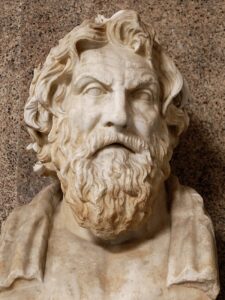
Cynicism is a philosophical attitude that is generally characterized by skepticism, disbelief, and a negative view of the world and human nature. Cynics often see others as motivated primarily by self-interest, and they tend to be distrustful of social norms and conventions.
In modern usage, the term “cynicism” often refers to a general attitude of negativity or pessimism towards human behaviour, institutions, or social norms. This can manifest as a belief that people are selfish, dishonest, or untrustworthy, or as a lack of faith in political or social systems.
The word “cynic” comes from the ancient Greek word “kynikos,” meaning “dog-like.” The original Cynics were a school of ancient Greek philosophers who rejected conventional social norms and lived a simple, ascetic lifestyle, often practicing self-sufficiency and self-reliance. However, their rejection of social norms was not purely negative, but rather a means of seeking a more authentic, truthful way of living.
The founder of the Cynic philosophical school was a Greek philosopher named Antisthenes, who lived in Athens during the 4th century BCE. Antisthenes was a student of Socrates.
Antisthenes believed that happiness and freedom could only be achieved through the rejection of conventional social norms and the pursuit of a simple, self-sufficient lifestyle. He believed that the ultimate goal of life was to live in accordance with nature and to be free from the desires and opinions of others. He also believed in the importance of virtue, honesty, and self-discipline.
The ideas of the Cynic philosophers have continued to be influential in modern times, particularly in the fields of ethics and social criticism. The Cynics’ emphasis on simplicity, self-sufficiency, and a rejection of conventional social norms has resonated with many people who seek to live more authentic, meaningful lives. The Cynic emphasis on virtue, honesty, and self-discipline also continues to be relevant in discussions of ethical behaviour and personal responsibility.
In addition, the Cynics’ critique of society and its institutions has influenced many social and political movements, including anarchism and countercultural movements. The Cynics’ sceptical and critical approach to authority and social conventions has also inspired many to question traditional sources of power and authority and to seek alternative ways of living and organizing society.
Who was Antisthenes?
 Antisthenes was known for his ascetic lifestyle and rejection of conventional social norms. He believed that true happiness and freedom could only be achieved through the rejection of material possessions and the pursuit of a simple, self-sufficient life.
Antisthenes was known for his ascetic lifestyle and rejection of conventional social norms. He believed that true happiness and freedom could only be achieved through the rejection of material possessions and the pursuit of a simple, self-sufficient life.
Antisthenes was also known for his emphasis on the importance of virtue and honesty. He believed that the ultimate goal of life was to live in accordance with nature and to be free from the desires and opinions of others.
Antisthenes’ philosophy was heavily influenced by Socrates’ teachings, particularly his emphasis on the importance of questioning conventional wisdom and seeking the truth. Antisthenes also drew inspiration from the ideas of other pre-Socratic philosophers, including Heraclitus and Parmenides.
While Antisthenes’ philosophy did not have a lasting impact in its own right, his ideas were influential in the development of later philosophical schools, particularly the Cynics and the Stoics.
Who was the most famous Cynic?
Diogenes of Sinope is generally considered to be the most famous Cynic philosopher. Whilst it is often said that he was a student of Antisthenes this is contested and may be a historical inaccuracy.
Diogenes lived a simple and ascetic life, much like his teacher Antisthenes. He rejected conventional social norms and material possessions, and reportedly lived in a large ceramic jar (a cracked pot in the marketplace). He was known for his frankness and blunt honesty, and was not afraid to speak his mind, even to those in positions of power.
Diogenes was also known for his biting wit and sense of humour. One of his most famous anecdotes involves his response to Alexander the Great, who had come to visit him and asked if there was anything he could do for him. Diogenes famously replied, “Yes, stand out of my sunlight.”
- When asked by someone what he gained from philosophy, Diogenes replied, “The ability to feel at ease in any company.”
- When Plato defined a man as “a featherless biped,” Diogenes plucked a chicken and brought it to Plato’s Academy before throwing it into the assembly, saying, “Here is Plato’s man.”
- When asked why he often walked around Athens in the middle of the day with a lamp, Diogenes replied, “I am looking for an honest man.”
- When Diogenes was once caught stealing a bowl, he is said to have quipped, “I wish I could steal a city and get caught!”
- When asked how he managed to endure the harsh Athenian winters without proper clothing, Diogenes replied, “I warm myself with the knowledge that I am not the only one suffering.”
Diogenes’ philosophy emphasized the importance of living in accordance with nature, rejecting material possessions, and seeking personal virtue and self-sufficiency. He believed that true happiness and freedom could only be achieved through living a simple, honest, and virtuous life. Diogenes’ ideas were influential in the development of later philosophical schools, particularly the Stoics. His legacy as the most famous Cynic philosopher has endured throughout the centuries, and his unconventional lifestyle and fearless honesty continue to inspire and fascinate people today.
Cynicism today.
The term cynic is usually used in a negative or pejorative sense, but nevertheless we can keep alive some of the old traditions of the Cynic philosophical school in modernity by embracing the fundamental truth of this ancient school by doing some of the following:
- Simplify your life. Cynics believe that true happiness and freedom can only be achieved through living a simple, self-sufficient life. By reducing your dependence on material possessions and focusing on the things that truly matter, you can cultivate a sense of inner peace and contentment.
- Be honest and straightforward. Cynics value honesty and straightforwardness, and they are not afraid to speak their minds, even if it means going against conventional wisdom or social norms. By being honest and straightforward in your own life, you can build stronger relationships and live with greater integrity.
- Be self-reliant. Cynics believe in the importance of self-reliance and personal responsibility. By taking ownership of your life and being proactive about solving problems, you can develop a greater sense of control and agency in your life.
- Reject conformity. Cynics reject many of the social norms and conventions that dictate how we should live our lives. By questioning the status quo and rejecting conformity, you can live a more authentic and fulfilling life.
- Embrace your inner nature. Cynics believe in the importance of living in accordance with nature and being true to yourself. By embracing your inner nature and pursuing the things that bring you joy and fulfilment, you can create a more meaningful and purposeful life.
By incorporating these principles into your daily life, you can live with greater authenticity, integrity, and self-awareness, and ultimately create a more fulfilling and satisfying life for yourself.


Excellent Article, Excellent Blog , Excellent Site ✅✅✅